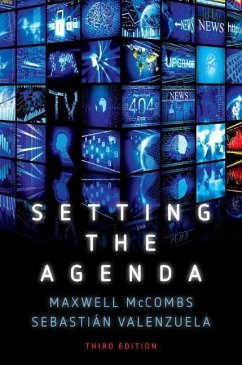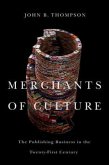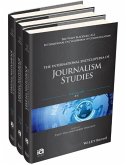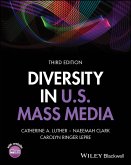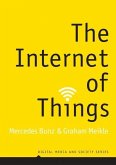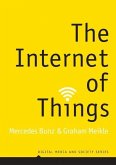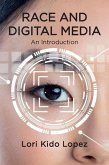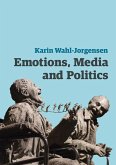News media strongly influence how we picture public affairs across the world, playing a significant and sometimes controversial role in determining which topics are at the centre of public attention and action. Setting the Agenda, first published in 2004, has become the go-to textbook on this crucial topic.
In this timely third edition, Maxwell McCombs - a pioneer of agenda-setting research - and Sebastián Valenzuela - a senior scholar of agenda setting in Latin America - have expanded and updated the book for a new generation of students. In describing the media's influence on what we think about and how we think about it, Setting the Agenda also examines the sources of media agendas, the psychological explanation for their impact on the public agenda, and their consequences for attitudes, opinions and behaviours. New to this edition is a discussion of agenda setting in the widened media landscape, including a full chapter on network agenda setting and a lengthened presentation on agenda melding. The book also contains expanded material on social media and the role of agenda setting beyond the realm of public affairs, as well as a foreword from Donald L. Shaw and David H. Weaver, the co-founders of agenda-setting theory. This exciting new edition is an invaluable source for students of media, communications and politics, as well as those interested in the role of news in shaping and directing public opinion.
Hinweis: Dieser Artikel kann nur an eine deutsche Lieferadresse ausgeliefert werden.
In this timely third edition, Maxwell McCombs - a pioneer of agenda-setting research - and Sebastián Valenzuela - a senior scholar of agenda setting in Latin America - have expanded and updated the book for a new generation of students. In describing the media's influence on what we think about and how we think about it, Setting the Agenda also examines the sources of media agendas, the psychological explanation for their impact on the public agenda, and their consequences for attitudes, opinions and behaviours. New to this edition is a discussion of agenda setting in the widened media landscape, including a full chapter on network agenda setting and a lengthened presentation on agenda melding. The book also contains expanded material on social media and the role of agenda setting beyond the realm of public affairs, as well as a foreword from Donald L. Shaw and David H. Weaver, the co-founders of agenda-setting theory. This exciting new edition is an invaluable source for students of media, communications and politics, as well as those interested in the role of news in shaping and directing public opinion.
Hinweis: Dieser Artikel kann nur an eine deutsche Lieferadresse ausgeliefert werden.
In many countries, professional journalism is in crisis, undermined by a perfect storm of collapsing business models and political attacks on its authority to speak the truth. Reese shows how institutional power matters deeply for journalism's crucial public role, but he goes further, by showing how such power now depends upon assemblages of actors far beyond the traditional newsroom. A fresh and exciting account that takes the field in new directions. Andrew Chadwick, Loughborough University Reese delivers an insightful analysis of the crisis of the modern press, and shows how journalism is reinventing itself in these challenging times for democracy. W. Lance Bennett, University of Washington "In many countries, professional journalism is in crisis, undermined by a perfect storm of collapsing business models and political attacks on its authority to speak the truth. Reese shows how institutional power matters deeply for journalism's crucial public role, but he goes further, by showing how such power now depends upon assemblages of actors far beyond the traditional newsroom. A fresh and exciting account that takes the field in new directions." Andrew Chadwick, Loughborough University "Reese delivers an insightful analysis of the crisis of the modern press, and shows how journalism is reinventing itself in these challenging times for democracy." W. Lance Bennett, University of Washington
"Agenda setting remains the core theoretical foundation of political communication research. McCombs and Valenzuela's new edition of Setting the Agenda should be considered a canonical text for the field. All students of political communication need to consume this valuable and approachable overview of the theory's central tenets."
R. Lance Holbert, Temple University
"To explore and understand how traditional and new media influence the public opinion process, theory-driven approaches are greatly needed. Agenda-setting theory, as McCombs and Valenzuela'sbook demonstrates, has been and still is an excellent guide for scholars pursuing this problem."
Toshio Takeshita, Meiji University
"Setting the Agenda: Mass Media and Public Opinion, since its first edition was printed in 2004, has become one of the most important textbooks on agenda-setting research... This book contains clear theoretical frameworks, introduces diversified research methods to test media effects, and conveys interesting discussions on the applications of agenda setting in a variety of contexts... This groundbreaking work is the best choice for students in the fields of communications, media, journalism, or politics."
International Journal of Communication
"Agenda setting remains the core theoretical foundation of political communication research. McCombs and Valenzuela's new edition of Setting the Agenda should be considered a canonical text for the field. All students of political communication need to consume this valuable and approachable overview of the theory's central tenets."
R. Lance Holbert, Temple University
"To explore and understand how traditional and new media influence the public opinion process, theory-driven approaches are greatly needed. Agenda-setting theory, as McCombs and Valenzuela'sbook demonstrates, has been and still is an excellent guide for scholars pursuing this problem."
Toshio Takeshita, Meiji University
"Setting the Agenda: Mass Media and Public Opinion, since its first edition was printed in 2004, has become one of the most important textbooks on agenda-setting research... This book contains clear theoretical frameworks, introduces diversified research methods to test media effects, and conveys interesting discussions on the applications of agenda setting in a variety of contexts... This groundbreaking work is the best choice for students in the fields of communications, media, journalism, or politics."
International Journal of Communication

